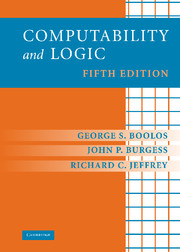Book contents
- Frontmatter
- Contents
- Preface to the Fifth Edition
- COMPUTABILITY THEORY
- BASIC METALOGIC
- 9 A Précis of First-Order Logic: Syntax
- 10 A Précis of First-Order Logic: Semantics
- 11 The Undecidability of First-Order Logic
- 12 Models
- 13 The Existence of Models
- 14 Proofs and Completeness
- 15 Arithmetization
- 16 Representability of Recursive Functions
- 17 Indefinability, Undecidability, Incompleteness
- 18 The Unprovability of Consistency
- FURTHER TOPICS
- Annotated Bibliography
- Index
11 - The Undecidability of First-Order Logic
Published online by Cambridge University Press: 05 June 2012
- Frontmatter
- Contents
- Preface to the Fifth Edition
- COMPUTABILITY THEORY
- BASIC METALOGIC
- 9 A Précis of First-Order Logic: Syntax
- 10 A Précis of First-Order Logic: Semantics
- 11 The Undecidability of First-Order Logic
- 12 Models
- 13 The Existence of Models
- 14 Proofs and Completeness
- 15 Arithmetization
- 16 Representability of Recursive Functions
- 17 Indefinability, Undecidability, Incompleteness
- 18 The Unprovability of Consistency
- FURTHER TOPICS
- Annotated Bibliography
- Index
Summary
This chapter connects our work on computability with questions of logic. Section 11.1 presupposes familiarity with the notions of logic from Chapter 9 and 10 and of Turing computability from Chapters 3–4, including the fact that the halting problem is not solvable by any Turing machine, and describes an effective procedure for producing, given any Turing machine M and input n, a set of sentences Г and a sentence D such that M given input n will eventually halt if and only if Г implies D. It follows that if there were an effective procedure for deciding when a finite set of sentences implies another sentence, then the halting problem would be solvable; whereas, by Turing's thesis, the latter problem is not solvable, since it is not solvable by a Turing machine. The upshot is, one gets an argument, based on Turing's thesis for (the Turing–Büchi proof of) Church's theorem, that the decision problem for implication is not effectively solvable. Section 11.2 presents a similar argument–the Gödel-style proof of Church's theorem–this time using not Turing machines and Turing's thesis, but primitive recursive and recursive functions and Church's thesis, as in Chapters 6–7. The constructions of the two sections, which are independent of each other, are both instructive; but an entirely different proof, not dependent on Turing's or Church's thesis, will be given in a later chapter, and in that sense the present chapter is optional. […]
- Type
- Chapter
- Information
- Computability and Logic , pp. 126 - 136Publisher: Cambridge University PressPrint publication year: 2007



